Garden Maintenance Kew
Introduction to Garden Maintenance in Kew 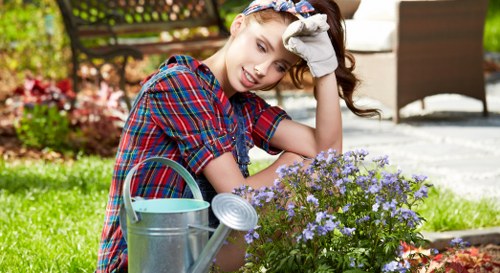
Welcome to our detailed exploration of Garden Maintenance Kew. This article is designed to offer you practical tips and expert advice on how to keep your garden in Kew looking stunning all year round. Whether you are a busy homeowner or a gardening enthusiast, understanding the best practices for maintaining your outdoor space can make all the difference. From seasonal tasks to daily care rituals, there's plenty to learn about keeping your garden pristine in this vibrant neighborhood.
Garden maintenance in Kew is not just about aesthetic appeal. It also involves ensuring that your plants and trees are healthy, reducing the risk of pests, and supporting local biodiversity. Kew is known for its rich history and lush landscapes, so offering these gardens the care they need is essential. By embracing eco-friendly techniques and smart scheduling, you can accomplish a garden that is both beautiful and sustainable.
In this article, we will cover a range of topics including basic maintenance tips, advanced landscaping ideas, and seasonal advice specific to the Kew area. Our goal is to provide you with a comprehensive guide that not only unlocks the secrets of garden upkeep in Kew but also inspires you to create an outdoor space you can be proud of.
Why Garden Maintenance is Essential in Kew 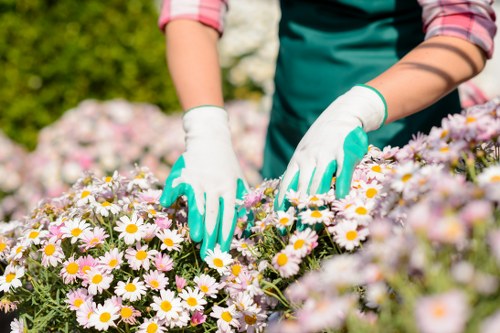
Garden maintenance in Kew is about more than just looking good. A well-maintained garden improves the overall air quality, supports local wildlife, and even boosts your home’s value. Maintaining these green spaces is a labor of love that benefits both the environment and the community. It is also a wonderful way to reconnect with nature, even within a bustling urban setting.
Regular garden upkeep involves activities such as mowing, pruning, weeding, and fertilizing. In Kew, where the climate and soil conditions are generally favorable for a wide variety of plants, these tasks help create a balanced ecosystem. Sustainable gardening practices, such as composting and rainwater harvesting, are not only cost-effective but also reduce your carbon footprint.
It is important to remember that maintaining a garden is an ongoing process. The dynamic nature of outdoor spaces means that new challenges will arise with each season. By staying proactive and flexible, you can handle any issues before they become overwhelming. In Kew, this proactive approach is particularly valuable given the unique mix of historic gardens and modern landscaping trends in the area.
Benefits for Homeowners and the Environment 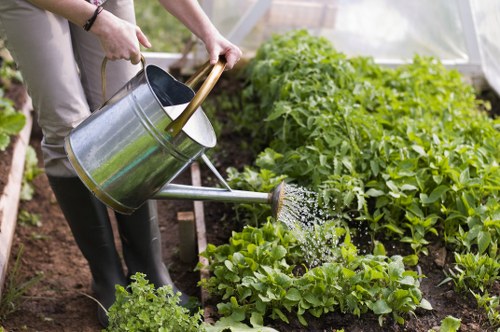
For homeowners, a healthy garden provides a serene sanctuary and a venue for outdoor entertainment. It can also be a source of local pride and a reflection of personal style. Regular garden care ultimately leads to a greener, more vibrant community and can increase the resale value of your home.
Beyond personal benefits, sustainable garden maintenance in Kew plays a role in environmental conservation. Healthy gardens support pollinators like bees and butterflies, reduce soil erosion, and help manage water runoff. Using natural fertilizers and organic pest control methods can transform your garden into a model of eco-friendly practices.
The rich history and cultural significance of Kew gardens make it a unique place to invest time and energy into your outdoor space. The tradition of meticulous garden care in this area contributes to its reputation as a hub of horticultural excellence and environmental stewardship.
Essential Garden Maintenance Tasks in Kew 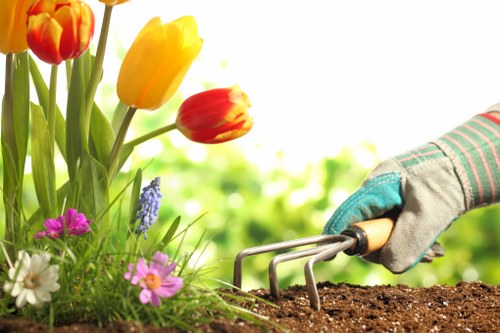
To achieve the perfect outdoor sanctuary, consistent maintenance is key. The following tasks are essential for every garden in Kew:
- Mowing and Trimming: Regularly trim your lawn to keep it neat and healthy.
- Weeding: Remove unwanted plants to prevent competition for nutrients with your flowers and shrubs.
- Pruning: Trim back dead or overgrown branches to promote healthy growth.
- Fertilizing: Supplement your soil with organic fertilizers to boost plant growth.
- Pest Control: Adopt eco-friendly methods to deter pests and diseases without harming beneficial insects.
These steps help maintain a balanced ecosystem in your garden. By planning a seasonal schedule that aligns with the natural growth cycles of local flora, you can ensure your garden remains a beautiful and inviting space throughout the year.
Seasonal Maintenance: Tips for Every Part of the Year 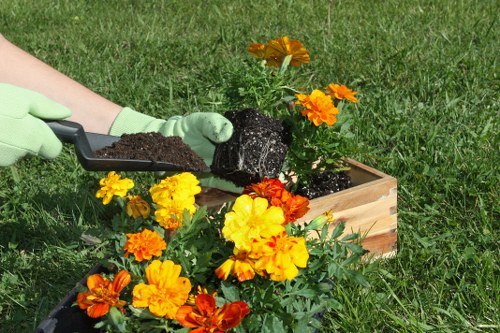
Spring is the season of renewal. Focus on planting new flowers, preparing your soil with compost, and creating colorful displays. Early spring maintenance sets the foundation for a thriving garden by giving plants a healthy start.
Summer requires more attention to water management and sun protection. Regular watering, mulching, and monitoring for pests are crucial during the warmer months. This season is perfect for enjoying your garden, so make sure to plan shaded areas where you can relax.
Autumn is the time to prepare for winter. Clean up fallen leaves, prune back aging plants, and give your garden a thorough tidy-up. These tasks help protect your garden against the cold and set the stage for a rebirth in the spring.
Advanced Landscaping Techniques in Kew
If you want to take your garden maintenance to the next level, consider incorporating advanced landscaping techniques. Modern landscaping in Kew includes the use of native plants, water-efficient systems, and innovative design elements that reflect both tradition and contemporary trends.
For a more structured approach, plan your garden in zones. Allocate areas for relaxation, play, and cultivation. This method allows you to focus on the unique aspects of each section while ensuring overall cohesion. A well-structured zone plan can help streamline maintenance tasks and improve the functionality of your garden.
Vertical gardening is another trend gaining traction. This technique maximizes space by growing plants on walls or trellises, making it ideal for smaller gardens or urban dwellings. Vertical gardens not only add visual interest but also contribute to improved air quality in urban areas.
Eco-Friendly Practices for Garden Maintenance
One of the most important aspects of garden maintenance in Kew is embracing sustainable and eco-friendly practices. These methods help to preserve our natural resources while enhancing the beauty and resilience of your garden. Using organic fertilizers, recycled materials, and natural pest repellents can significantly reduce your environmental impact.
Consider implementing rainwater harvesting systems to reduce your dependency on municipal water. This not only conserves water but also helps reduce your monthly bills. Installing a rain barrel under a downspout is a simple yet effective step towards responsible watering practices.
Additionally, practicing composting is highly beneficial. By recycling kitchen and garden waste, you create nutrient-rich compost that can be returned to your garden. This closed-loop system minimizes waste and enriches your soil naturally.
Designing a Garden Maintenance Routine
Creating a garden maintenance routine can seem overwhelming at first, but with a clear plan, it becomes manageable. Start by listing all the tasks you need to complete on a regular basis. Breaking down these tasks into daily, weekly, monthly, and seasonal activities will help you stay organized.
Here are some basic tips to structure your routine effectively:
- Daily Tasks: Watering, quick inspections for pests, and removing visible waste or debris.
- Weekly Tasks: Mowing, weeding, and light pruning.
- Monthly Tasks: Deeper cleaning, soil testing, and the application of fertilizers.
- Seasonal Tasks: Major pruning, planting new arrivals, and preparing for the seasonal changes.
With a routine in place, you can ensure that your garden receives the care it needs on a consistent schedule, making large projects more manageable over time.
Integrating Technology into Garden Care
Modern garden maintenance is becoming even more effective with the integration of new technologies. Smart irrigation systems, soil moisture sensors, and mobile apps dedicated to garden management are some of the tools available to help you keep track of your garden’s health. These innovations allow you to customize watering schedules and receive alerts when maintenance is required.
Additionally, online platforms offer a wealth of knowledge from gardening communities and experts who share their tips and advice. By using these digital resources, you can stay updated with the latest trends and adapt your garden maintenance routine accordingly.
Technology can also help you track seasonal changes and adapt your garden planning. Whether you are a beginner or an expert, incorporating simple tech solutions can save time and enhance the efficiency of your garden care routine.
Local Relevance: Neighbourhoods Near Kew and Their Unique Features
Kew is surrounded by a rich tapestry of neighborhoods, each contributing to the vibrant local culture. Understanding the nearby areas is essential for tailoring your garden maintenance routines to local climates, soil types, and community traditions.
Below is an in-depth look at several areas near Kew, including their proximity and special characteristics which might affect garden care:
- Richmond: Located just a few miles from Kew, Richmond boasts lush parks and historic estates. Its gardens tend to have mature trees and sprawling lawns, demanding regular pruning and deep fertilization.
- Barnes: A quaint riverside area near Kew, Barnes is known for its charming cottages and vibrant community gardens. Local residents emphasize organic and sustainable gardening practices.
- Twickenham: Just a short drive away, Twickenham features parks and recreational areas. Garden maintenance here often includes maintaining open green spaces and community flower beds.
- Wimbledon: With its blend of urban and suburban landscapes, Wimbledon gardens vary from sleek modern designs to traditional English gardens. Custom maintenance schedules are popular to suit diverse plant needs.
- Putney: A bustling neighborhood along the river, Putney's garden enthusiasts often incorporate water-wise practices due to its riverside location.
- Chiswick: Known for its elegant tree-lined streets and boutique gardens, Chiswick sees a mix of modern and classic gardening techniques, with emphasis on seasonal blooms.
- Brentford: Just on the edge of Kew, Brentford provides a mix of industrial and residential zones. Homeowners here often focus on hardy plants that withstand urban conditions.
- Hounslow: This diverse area is known for its multicultural influences on garden design, often incorporating a variety of plants and unique landscaping styles.
- Ealing: Located further out, Ealing boasts expansive gardens and parks that require regular expert maintenance, especially during seasonal transitions.
- Acton: With its evolving landscape and modern urban gardening trends, Acton’s residents lean towards innovative and eco-friendly garden solutions.
These neighboring areas not only reflect the cultural diversity around Kew but also share common challenges in garden care. Recognizing these local differences can help you adopt strategies that are best suited to your garden’s location and environment.
Combining Traditional and Modern Garden Techniques
The fusion of traditional and modern methods is a hallmark of garden maintenance in Kew. The area is rich in history, yet many homeowners embrace new techniques that streamline maintenance and enhance garden beauty. Merging old-school practices like careful hand-pruning with contemporary practices such as smart irrigation creates a balanced approach that honors heritage while embracing innovation.
Traditional methods include tasks such as manual weeding, using heirloom seeds, and preserving vintage garden layouts. Modern garden maintenance, on the other hand, utilizes advanced technology and eco-friendly products to minimize environmental impact.
This combination allows gardeners to benefit from the strengths of both approaches. For example, natural pest repellents can be used alongside modern monitoring systems, ensuring your plants are protected without harmful chemicals.
Maintaining Your Garden on a Budget
Effective garden maintenance doesn't have to break the bank. Many practices, such as composting, natural fertilizers, and DIY projects, are cost-effective methods to keep your garden healthy. Thrifty gardeners in Kew often find that investing time in planning and using recycled materials can yield impressive results.
Here are some budget-friendly tips for garden maintenance:
- DIY Compost: Use kitchen scraps and garden waste to make nutrient-rich compost.
- Rainwater Collection: Install rain barrels to save on water bills.
- Seed Swapping: Exchange seeds with local gardeners to diversify your plant selection.
- Hand Tools: Invest in basic, high-quality hand tools that will last longer and require less maintenance.
By incorporating these strategies, you can maintain a vibrant garden without overspending. Many residents in Kew have successfully turned simple, eco-friendly practices into cornerstones of their garden care routines.
Community Support and Educational Resources
One of the greatest assets of garden maintenance in Kew is the sense of community. Local gardening clubs and workshops offer valuable resources for both beginners and experienced gardeners. Engaging with these groups can provide not only practical advice but also social support—knowing that others share your passion for outdoor spaces.
Educational resources such as online tutorials, local libraries, and community centers offer classes on topics ranging from basic planting techniques to advanced landscaping design. These opportunities can enrich your understanding and inspire your garden projects.
Moreover, local events and garden tours in Kew highlight innovative designs and practical solutions. Participating in these events can spark new ideas and provide valuable connections with local experts who are eager to share their knowledge.
Final Thoughts on Garden Maintenance in Kew
Maintaining a garden in Kew is a rewarding journey that blends tradition with innovation. By following a well-planned routine and embracing both eco-friendly and modern practices, you can create a beautiful, sustainable environment that benefits both you and the community.
From seasonal care to technological advancements and community involvement, every aspect of garden maintenance in Kew is an opportunity to learn and grow. With a little effort, your garden can become a vibrant oasis that reflects the rich cultural heritage and natural beauty of this historic area.
Whether you are planning to revamp your existing garden or starting from scratch, let this guide be your companion in creating a space that not only looks stunning but also thrives in harmony with nature.
Frequently Asked Questions (FAQs) on Garden Maintenance Kew
1. How often should I water my garden in Kew?
Answer: Watering frequency depends on the type of plants, soil type, and weather conditions. In general, early morning watering a couple of times a week works well. Adjust based on seasonal rainfall and temperature fluctuations.
2. What are some eco-friendly pest control methods?
Answer: Consider using natural remedies like neem oil or insecticidal soap, introducing beneficial insects, and practicing crop rotation. These methods help manage pests without harming the ecosystem.
3. Are there specific garden maintenance tasks for each season?
Answer: Yes. In spring, focus on planting and preparing the soil. Summer requires regular watering and mulching. In autumn, clear debris and prune plants; winter maintenance includes protection against frost and planning for the upcoming season.
4. How can technology improve my garden maintenance routine?
Answer: Modern tools such as smart irrigation systems and moisture sensors can help optimize watering schedules, while mobile apps offer reminders and gardening tips. These technologies make it easier to manage your garden efficiently.
5. What are the best practices for maintaining a sustainable garden?
Answer: Use organic fertilizers, rainwater harvesting systems, and implement composting. Additionally, select native plants that are adapted to the local climate, reducing the need for excessive care and resource usage.

